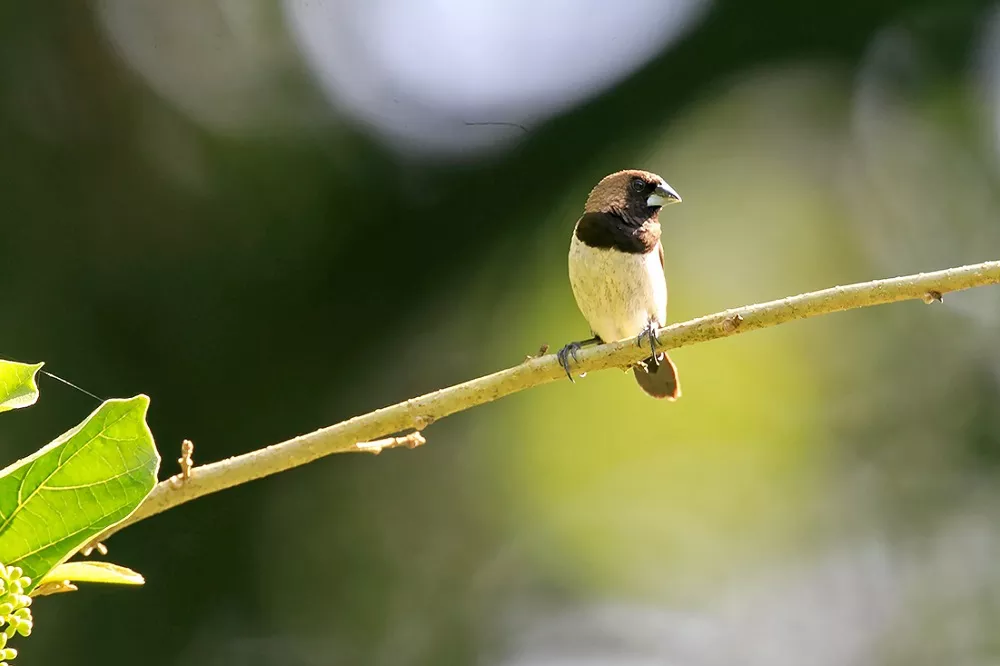The Javan Munia (Lonchura leucogastroides), also known as the Javan Ricebird or Java Sparrow, is a small passerine bird species native to the Indonesian islands of Java, Bali, and Bawean. With its distinctive appearance and melodious song, the Javan Munia has gained popularity as both a pet and an avicultural subject. In this article, we will explore the diet of the Javan Munia, shedding light on its natural feeding habits and the optimal approach to providing a balanced diet for captive individuals.
Natural Diet of Javan Munia
Javan Munias are omnivores, which means they eat both plant and animal matter. In their natural habitat, they primarily feed on grass seeds, rice, millet, and other small grains. They also consume insects, spiders, and other small invertebrates for protein.
These birds are typically found in grasslands, rice paddies, and other open areas where they can easily find their preferred food sources. They have strong bills that allow them to crack open tough seed shells, and they are agile enough to catch insects on the fly.
Providing a Balanced Diet for Your Pet Javan Munia
If you’re planning to keep a Javan Munia as a pet, it’s important to provide them with a balanced diet that meets their nutritional needs. Here are some tips on what to feed your pet Javan Munia:
Seeds: As mentioned earlier, Javan Munias love seeds, so make sure that they make up a significant part of their diet. You can offer a variety of seeds, such as millet, canary grass, and Niger seed, to keep things interesting for your bird. Avoid feeding your bird too many sunflower seeds, as they are high in fat and can lead to obesity.
Pellets: Another option for providing your Javan Munia with a balanced diet is to offer pellets. These are specially formulated bird food that contains all the necessary nutrients that your bird needs to stay healthy. Make sure to choose pellets that are specifically designed for small birds like the Javan Munia.
Fresh fruits and vegetables: In addition to seeds and pellets, it’s important to provide your Javan Munia with fresh fruits and vegetables. These can include apples, berries, carrots, and leafy greens. Make sure to chop them into small pieces so that your bird can easily eat them.
Protein sources: To meet their protein needs, you can offer your Javan Munia small amounts of cooked egg, mealworms, or crickets. These should be offered as occasional treats rather than a regular part of their diet.
Grit: Finally, make sure to provide your Javan Munia with grit. Grit helps the bird to digest its food by grinding it up in their gizzard. You can purchase commercial grit from pet stores or provide your bird with crushed eggshells or oyster shells.
Additional Tips for Feeding Your Javan Munia
Here are some additional tips to keep in mind when feeding your Javan Munia:
- Offer a variety of foods to keep your bird interested and engaged.
- Make sure that your bird has access to clean, fresh water at all times.
- Avoid feeding your bird avocado, chocolate, caffeine, alcohol, or anything that contains high levels of salt or sugar.
- Don’t overfeed your bird. Obesity is a common problem among pet birds and can lead to serious health issues.
- Monitor your bird’s food intake and adjust their diet if necessary. If your bird appears to be losing weight or gaining too much weight, talk to your veterinarian about adjusting their diet.
In Conclusion
Javan Munias are charming little birds that make wonderful pets for those who have the time and resources to care for them properly. By providing your pet Javan Munia with a balanced diet that meets their nutritional needs, you can help ensure that they live a long, healthy, and happy life.
Remember to offer a variety of foods, including seeds, pellets, fresh fruits and vegetables, and occasional protein sources. Make sure that your bird has access to clean water and grit, and avoid feeding them anything that is toxic or unhealthy.
With a little bit of effort and attention to your Javan Munia’s dietary needs, you can enjoy many years of companionship with these delightful little birds.


 Facebook
Facebook  Instagram
Instagram  Youtube
Youtube 